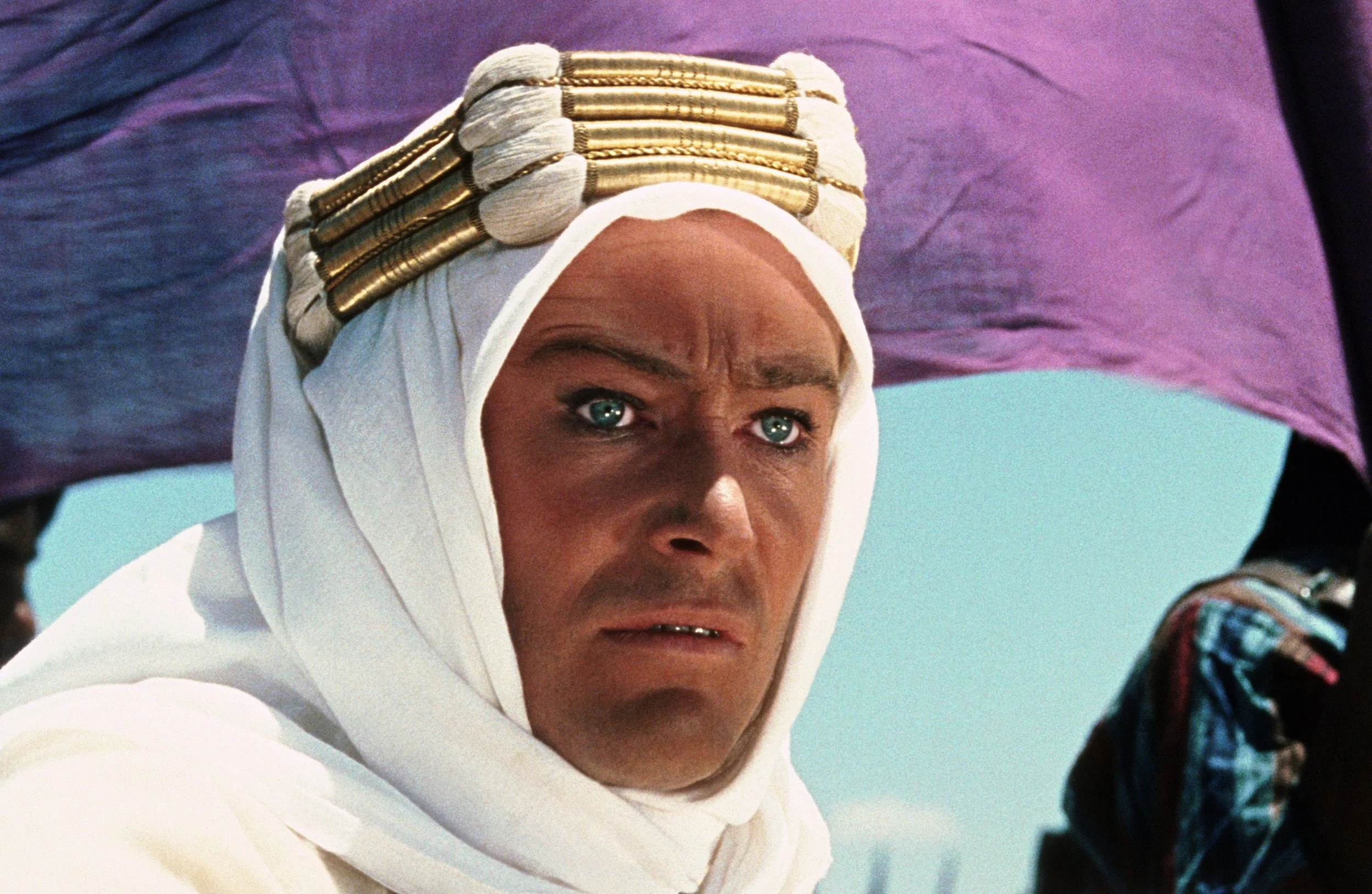“The trick is not minding:” Lawrence of Arabia and the uses of war
It has been nearly a week since Russian forces invaded Ukraine, instigating the largest conventional military attack in Europe since the Second World War. Most people living today have never been faced with a conflict of this scale; the reality of war — specifically, war that doesn’t involve U.S. aggression in South Asia or the Middle East — is something that most of us have only previously witnessed from the vantage points of textbooks, museums… and, of course, the movies.
The evening of the invasion, I visited my parents’ house and, after they’d gone to bed, happened to find Lawrence of Arabia playing on TCM. I tuned in at the moment when T. E. Lawrence (Peter O’Toole), after crossing the “impassable” Nefud Desert at night with fifty men, discovers that one of his fellow travelers has fallen from his camel en route and is now stranded. Despite protests from Sherif Ali (Omar Sharif), who insists that he is crazy to do so, Lawrence ventures back into the wasteland just as day breaks, and, finding the man, miraculously returns to camp before the sun’s heat can kill either them.
It was stirring and strange to rewatch this noble episode at the instigation of a new, brutally immoral war. Lawrence of Arabia is based upon the real-life British officer’s involvement in the Arab Revolt of 1916 — specifically, his surprise attack on the Turks at the port city of Aqaba and his role in capturing Damascus. This track record poised T. E. Lawrence as an unusually adroit poster child for Britain’s self-aggrandizing narratives during the First World War: here is a man, they could say, who is serving the British cause while also liberating those oppressed by the Ottomans.
In fact, Lawrence was primarily devoted to Arabia — but just as assuredly as his actions helped overthrow the Turks, so too did they facilitate British rule after the war’s end.
But T. E. Lawrence’s accomplishments are even murkier than this postscript allows; just because the man’s motives were noble doesn’t mean that his actions were pure, or even virtuous. Early in the film, directed by David Lean from a screenplay by Robert Bolt and Michael Wilson, O’Toole’s Lawrence entertains several officers at the British headquarters in Cairo by allowing the flame from a match to scorch his fingers before extinguishing it. When a fellow officer tries to do the same, but then gasps in pain, Lawrence smirks: “The trick is not minding that it hurts.”
Later, once he has entered the desert, Lieutenant Lawrence meets with Prince Faisal (Alec Guinness), who is leading the Arabian revolt against the Turks. The prince, eyebrow arched, observes of Lawrence’s fieriness: “I think you are another of these desert-loving English. No Arab loves the desert. We love water and green trees.”
It is in the negative space of these moments that Lean draws parallels between Lawrence’s delight in the match-flame parlor trick and his aptitude for enduring, perhaps even relishing the pain of the desert. Cinematographer Freddie Young’s lens represents the sprawling dunes and Peter O’Toole’s languid face as equal in grandeur, equal in their hidden capacity for cruelty. Lauded as the greatest epic of all time, at its heart Lawrence of Arabia is an intimate examination of the ties between suffering, pleasure, and the masochistic efforts that enable empire.
Of course, though, what martyrs may foster in the way of masochism, emperors match in sadism. O’Toole’s Lawrence is driven by a Messiah complex, seeing himself as integral to the liberation and formation of a unified Arabia — yet his total immersion in the Arab cause is complicated, or syncopated by his identity as a white Englishman. Upon his return to Cairo, Lawrence confesses to General Allenby (Jack Hawkins) that, after executing an Arabian man for starting a fight with an enemy tribe, he’s discovered that he actually enjoys killing. This revelation is followed up by the massacre outside Tafas: Lawrence leads his men in a charge against a line of Turkish soldiers, and goes on a killing spree.
As he strides through the flailing, defenseless troupe, Lawrence is approached by a soldier — scrambling, hands raised in surrender. He takes one looks at the soldier and shoots him in the face.
The mythology of T. E. Lawrence paints him as a divine warrior, but what makes the man’s personal journey all the more intriguing in this movie is that he unwittingly evolves from self-punishing expat to murderous agent of genocide. “The English have a great hunger for desolate places,” Prince Faisal says. “I fear they may hunger for Arabia.” “I’m different,” Lawrence assures him — but later, when the lieutenant, indignant, watches as England does invade the region, Mr. Dryden (Claude Rains) chastises him: “You may not have known, Lawrence, but you certainly had suspicions.”
Invasion is always a demonstration of innate cruelty, regardless of its motives. In Lawrence of Arabia, war’s use or usefulness resides not only in who instigates or resolves conflict, but whoever is available to do the dirty work of seeing it through. Dictators are the ones who drive combat, but they exploit the most self-loathing among us — men who, during peacetime, resort to less conspicuous forms of destruction — and make them heroes.
